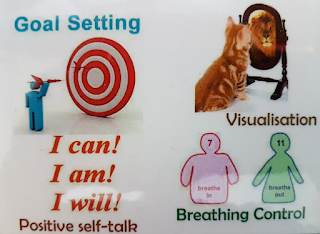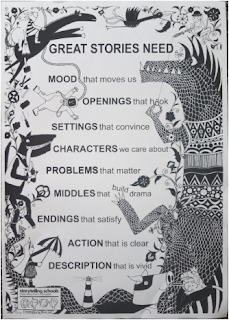Looking back on my 'I see it..., I want it..., I dream it...' post at the start of the year, my one word was 'SEE'...
Reflecting on my 'SEE'
1. I will be open to seeing the possibilities, the problems, the solutions and the milestones that can be reached every day.
2. Focusing more on the “why”, not just the “what” and “how” when stepping back from the day-to-day planning and details of my work, will allow me to not only see the big picture, but also the immediate achievements and needs.
3. I would like to see that the link between our school, parents, whānau and community where our school's educational goals are concerned are understood and supported. This will enable us to further create and nurture relationships of trust.
4. My job will be done if I could see the simple question “What’s best for ________?” being asked and acted upon. After all, staff well-being is crucial, and it is also our responsibility to ensure that students are excited about learning and to inspire a deep love for learning.
5. I know that the insanely long hours I work, is not contributing to recuperating and focusing on myself. I achieve my goal of seeing myself take time out at least once a week, to 'de-stress' and to improve my work-life balance to avoid burnout.
Highlights for me this year
1. Some of my Professional Development included:
2. Teaching as Inquiry:
Reflecting on my 'SEE'
1. I will be open to seeing the possibilities, the problems, the solutions and the milestones that can be reached every day.
2. Focusing more on the “why”, not just the “what” and “how” when stepping back from the day-to-day planning and details of my work, will allow me to not only see the big picture, but also the immediate achievements and needs.
3. I would like to see that the link between our school, parents, whānau and community where our school's educational goals are concerned are understood and supported. This will enable us to further create and nurture relationships of trust.
4. My job will be done if I could see the simple question “What’s best for ________?” being asked and acted upon. After all, staff well-being is crucial, and it is also our responsibility to ensure that students are excited about learning and to inspire a deep love for learning.
5. I know that the insanely long hours I work, is not contributing to recuperating and focusing on myself. I achieve my goal of seeing myself take time out at least once a week, to 'de-stress' and to improve my work-life balance to avoid burnout.
Highlights for me this year
1. Some of my Professional Development included:
- Strengths-based Leadership Development - Rob Clarke, Learning Architects (2019 - Current)
- The Coaching Habit - Anne Giles, Direction Worx (2019)
- Empowering Leaders to Empower Learning - Leanne Angland (2019)
- Stress Management and WELL-being - Rotorua AP/DP Association (2019)
- Igniting your imagination in Digital Technologies and Hangarau Matihiko meetup - MOE (2019)
- Level 3 Special Learning Disabilities Course - SPELD NZ (2019)
- HiveSummit (14 day) Virtual Educational Conference (2019)
- Notice & Adjust: Supporting Students with Learning Difficulties workshop - Neil MacKay (2019)
- Story Ways Literacy: Storytelling Schools NZ (students learn to develop great oral communication skills while mastering the language and ideas they need for subsequent writing) by Liz Swanson (2019)
- Accelerated Learning in Literacy (ALL) start up workshop - Kath Jones & Colleen Wills (2019)
- Developing an effective writing programme workshop by Sheena Cameron & Louise Dempsey (2019)
These PD opportunities opened the seeing of possibilities, the problems, the solutions and the milestones that could be reached every day. It also assist in often focusing more on the “why”, not just the “what” and “how” when stepping back from the day-to-day planning and details of my work, which allowed me to not only see the big picture, but also the immediate achievements and needs.
2. Teaching as Inquiry:
After administering an Oral assessment, I analysed the data, which helped me to identify target learners who are ‘at risk’ and their specific areas of need. I then started my 'Teaching as Inquiry' by asking: "How can I use a Storytelling approach to accelerate target learners and enhance their oral language skills through retelling of stories, news, after guided reading & using Seesaw, which will then also result in authentic writing experiences?"
I planned deliberate activities that meet the needs of these learners, whilst also capitalising on spontaneous authentic learning opportunities that support oral language development.
Student achievement can be seen as shown in the end of year spreadsheet below.
~ 'He mana tō te kupu' - 'Words have great power' - a whakataukītanga kōrero (proverbial saying) ~
I planned deliberate activities that meet the needs of these learners, whilst also capitalising on spontaneous authentic learning opportunities that support oral language development.
Student achievement can be seen as shown in the end of year spreadsheet below.
It should be noted that the my student whom only made 1 Stanine’s progress received Speech Language Therapy support and also has had a Language Learning Intervention plan by an outside agency. Unfortunately, funding for this was only available and in place for Term 2. However, I am pleased with the overall outcome of this inquiry.
3. My Presentations:
4. End of Year Highlights:
I received so many lovely messages and gifts... here's just a few messages... #EndOfYear #FeelingBlessed
- Digital Technologies | Hangarau Matihiko: Build knowledge - Develop Knowledge - Follow up and teaching lessons, activities and resources provided (Staff meeting - 29 July 2019)
- Digital Technologies | Hangarau Matihiko: Build knowledge - Develop Knowledge (Staff meeting - 1 April 2019)
- Seesaw: The Learning Journal - Need to know (Staff meeting, especially for all new staff - 4 February 2019)
I received so many lovely messages and gifts... here's just a few messages... #EndOfYear #FeelingBlessed
~ "The attitude you bring to the day is what the day will bring to you. Great attitude. Great day." - Unknown ~

























